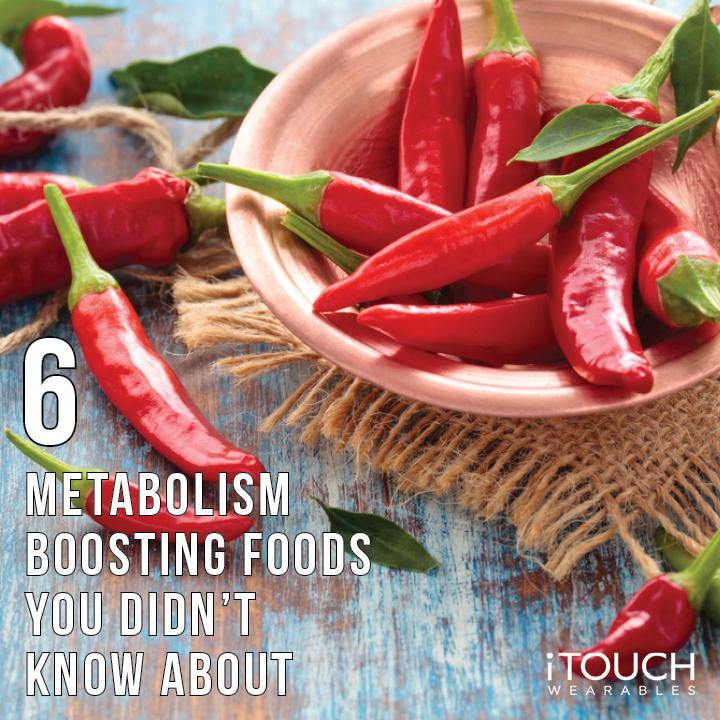
6 Metabolism Boosting Foods You Didn't Know About
Whether you're familiar with the fitness world or game, or if you are someone who just started setting goals to lose weight, gain weight or even just maintain weight, you probably know that seeing results comes down to one thing - calories coming into your body versus calories being burned off. However, when it comes to maintaining calories, the total amount of calories you burn actually comes less from exercise and more from your metabolism. Metabolism is the process of converting calories into energy that occurs naturally in your body throughout the day. The calories you use when breathing, digesting, and in just generally being alive, are known as your basal metabolic rate (BMR). Increase your BMR, and you’ll increase your daily calorie burn.
What exactly does that entail? Well, this brings us to something called thermogenesis, which in simpler terms, is a word for the metabolic process in which your body produces heat (or energy) by burning calories. In an analogy often used to describe thermogenesis, you can think of it like your internal furnace. When you exercise, you are essentially cranking up this internal furnace. This also happens during digestion and due to environmental factors, like shivering when it’s cold outside.
According to a study performed by The Nutrition and Metabolism Journal, diet-induced thermogenesis accounts for 5 to 15% of your daily calorie burn. So, an interesting question to be raised is, "can you increase your metabolism by eating certain foods?"
The answer is, no food boosts your metabolism long term, but some foods can help give you a little boost when it does come to the body's daily metabolic processes. Curious as to what they are? Well we have the guide for you! Here are 6 metabolism boosting foods you didn't know about:
Chili Peppers

You heard that right, chili peppers can help boost your metabolism! If you like heat, your metabolism is in luck. Capsaicin is a chemical found in peppers that may play a slight role in boosting metabolism. Research released in Appetite by the National Library of Medicine suggests that consuming 135 to 150 milligrams of capsaicin might result in burning an extra 50 calories each day. That might not sound like much, but do a little math, and that accounts for about 5 pounds per year. It was found within this research as well that chili peppers and capsaicin have increased energy expenditure, increased lipid oxidation and reduced appetite within participants of the study.
Coffee

It is said that caffeine is a central nervous system stimulant and can actually help you burn more calories and possibly burn more fat. In a study released by the Department of Nutrition at King's College, University of London, UK, showed coffee can increase your metabolic rate by up to 11%. Compared to that of another study released by the Department of Human Biology, Nutrition and Toxicology Research Institute at Maastricht University found that people who consume 270 milligrams of caffeine daily can burn an extra 100 calories. It is important to note that caffeine affects every person differently, and caffeine-sensitive people should be careful not to overdo it. The 270 milligrams mentioned above is equivalent to about three cups of coffee, which may be too much for some people to handle.
Green and Oolong Tea

The caffeine in tea has also been shown to help boost metabolism a small amount, similar to that of coffee. There have been studies that show that oolong tea may increase your body’s energy expenditure by as much as 10% over a 2-hour period, and that the tea may also be effective in increasing fat oxidation. In addition, oolong and green teas may help your body use stored fat for energy more effectively, increasing your fat-burning ability by up to 17%.
Legumes

Legumes and pulses, such as lentils, peas, chickpeas, beans and peanuts, are particularly high in protein compared to other plant foods. There are multiple studies suggesting that their high protein content requires your body to burn a greater number of calories to digest them, compared to that of lower-protein foods. It was also reported that legumes contain a good amount of dietary fiber, such as resistant starch and soluble fiber, which your body can use to feed the good bacteria living in your intestines. In turn, these friendly bacteria can help your body use stored fat as energy and maintain normal blood sugar levels.
In one study done by the Department of Nutrition and Food Sciences, Physiology and Toxicology, at the University of Navarra in Spain, humans consuming a legume-rich diet for eight weeks experienced beneficial changes in metabolism and lost 1.5 times more weight than the control group who didn't. Legumes are also said to be high in arginine, an amino acid that may increase the amount of carbs and fat your body can burn for energy. In addition, peas, fava beans and lentils also contain substantial amounts of the amino acid glutamine, which may help increase the number of calories burned during digestion.
Cacao

Cacao and cocoa aren't just delicious treats! There are multiple studies the prove that they may also benefit your metabolism. For instance, although these are not studies performed on humans, it was found that mice who were given cocoa and cocoa extracts promoted the expression of genes that stimulate the use of fat for energy. This seems especially true in mice fed high-fat or high-calorie diets. Interestingly, one study had actually suggested that cocoa may prevent the action of enzymes necessary to break down fat and carbs during digestion. In doing so, cocoa could theoretically play a role in preventing weight gain by reducing the absorption of some calories. However, human studies examining the effects of cocoa, cacao or cacao products such as dark chocolate are rare. More studies are needed before strong conclusions can be made.
Coconut Oil

Coconut oil is high in medium-chain triglycerides (MCTs). Unlike long-chain fats, once MCTs are absorbed, they go directly to the liver to be turned into energy. This makes them less likely to be stored as fat. Interestingly, several studies show that MCTs can increase metabolic rate more than longer-chain fats, such as one posted by the School of Dietetics and Human Nutrition at McGill University. In addition, researchers report that a daily intake of 30 ml of coconut oil may successfully reduce waist size in obese individuals.
Ready to get your calorie burning on?
Share with us whether you were surprised by these facts by following us on Instagram @itouchwearables and Facebook @itouchwearables and by dropping a comment and like. Also, be sure to check out our new articles published daily and the latest styles on iTouchWearables.com!
-Patrick


